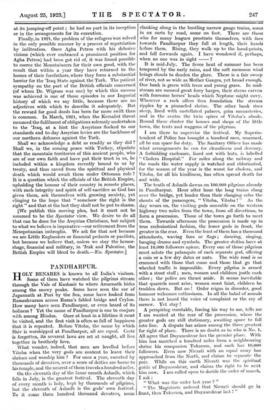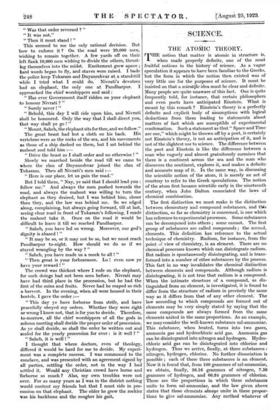PANDHARPUR.
HOLY BENARES is known to all India's visitors. Some of them have watched the pilgrims stream through the Vale of Kashmir to where Amarnath hides among the snowy peaks. Some have seen the car of Jagannath at Puri by the Sea, some have looked from Rameshvaram across llama's fabled bridge and Ceylon. How many have seen Pandharpur, or even heard of its holiness ? Yet the name of Pandharpur is one to conjure with among Hindus. Once at least in a lifetime it must be visited, and the first visit is often so full of happiness that it is repeated. Before Vitoba, the name by which Shiv is worshipped at Pandharpur, all arc equal. Caste is forgotten, its severest laws are set at naught, all live together in brotherly love.
. What wonder, indeed, that men are levelled before Vitoba when the very gods are content to leave their shrines and worship him ? For once a year, escorted by thousands of devotees, over a score of deities are borne to his temple, and the nearest of them travels a hundred miles.
On the eleventh day of the lunar month Ashadh, which falls in July, is the greatest festival. The eleventh day of every month is holy, kept by thousands of pilgrims, but the eleventh of Ashadh is the gods' own festival. To it come three hundred thousand devotees, some clanking along in the bustling narrow gauge trains, some in ox carts by road, some on foot. There are those who for many leagues prostrate themselves, with face towards Pandharpur they fall at length, their hands before them. Rising, they walk up to the hand-prints, and fall forwards again. I have wondered if, perhaps, when no one was in sight —?
It is mid-July. The fierce heat of summer has been tempered by the early rains, and the soft monsoon wind brings clouds to deaden the glare. There is a fair sweep of river, not so wide as Mother Ganges, yet broad enough. One bank is green with trees and young grass. In mid- stream are moored great ferry barges, their sterns carven with fearsome horses' heads which Neptune might envy. Wherever a rock offers firm foundation the stream ripples by a pinnacled shrine. The other bank rises steep, lined with castellated palaces, grim monasteries, and in the centre the twin spires of Vitoba's abode. Round these cluster the houses and shops of the little town, the tents and waggons of the pilgrims.
I am there to supervise the festival. My Superin- tendent of Police has brought a hundred men, unarmed, all he can spare for duty. The Sanitary Officer has made what arrangements he can for cleanliness and decency. A forbidding enclosure, lined out with huts, is labelled "Cholera Hospital." For miles along the railway and the roads the water supply is watched and chlorinated, for the season of the year is the worst for cholera, and Vitoba, for all his kindliness, has often spread death .far and wide.
The tenth of Ashadh dawns on 100,000 pilgrims already in Pandharpur. Hour after hour the long trains clang over the bridge, yet louder than their clanging echo the shouts of the passengers, "Vitoba, Vitoba ! " As the day wears on, the visiting gods assemble on the western highway two miles from the town, from all directions, to form a procession. Those of the town go forth to meet them. Towards afternoon the procession is made up in true ecclesiastical fashion, the lesser gods in front, the greater in the rear. Even the least of them has a thousand attendants, waving fans or flags ; dancing, singing, banging drums and cymbals. The greater deities have at least 10,000 followers apiece. Every one of those pilgrims must salute the palanquin of each separate god, offering a coin or a few dry dates or nuts. The wide road is so crammed with those that come and, those that go that wheeled traffic is impossible. Every pilgrim is armed with a stout staff ; men, women and children jostle each other ; the police are thrust aside. It seems inevitable that quarrels must arise, women must faint, children be trodden down. But no I Order reigns in disorder, good humour welcomes enthusiasm. In all the babel of sounds there is not. heard the voice of complaint or the cry of sorrow. Yet stay !
A perspiring constable, forcing his way to me, tells me I am wanted at the rear of the procession, where the greater gods are still stationary, awaiting space to fall into line. A dispute has arisen among the three greatest for right of place. There is no doubt as to who is No. 1. All agree that Dnyaneshvar has the premier place. With him has marched a hundred miles from a neighbouring shrine his companion Tukaram, and each has 10,000 followers. Even now Nivrati with an equal army has approached from the North, and claims to separate the pair. While on this earth Nivrati was the spiritual guide of Dnyaneshvar, and claims the right to be next him now. I am called upon to decide the order of march. I ask : "What was the order last year ? "
"The Magistrate ordered that Nivrati should go in front, then Tukaram, and Dnyaneshvar last ! " "Was that order reversed ? "
"It was not."
"Then it must stand ! "
' This seemed to me the only rational decision. But how to enforce it ? On the road were 20,000 men, -wishing to remain together. A few yards off on their left flank 10,000 men wishing to divide the others, thrust- ing themselves into the midst. Excitement grew apace ; Nod words began to fly, and staves were raised. I bade the police keep Tukaram and Dnyaneslivar at,a standstill while I tried what I coilld do. Nivrati's devotees had an elephant, the only one at Pandharpur. I approached the chief worshippers and said : "Has ever Government. itself ridden on your elephant to honour Nivrati ? "
"Surely never 1" "Behold, this day I will ride upon him, and Nivrati shall be honoured. Only the way that I shall direct you, that way shall ye go!"
"Mount, Saheb, the elephant sits for thee, and we follow."
• The great beast had but a cloth on his back. His vertebrae were as the rocks of the sea, and his movements as those of a ship dashed on them, but I sat behind the mahout and told him :— " Drive the beast as I shall order and no otherwise ! "
Slowly we marched beside the road till we came to where the clan of Dnyaneshvar joined the clan of Tukaram. Then all Nivrati's men said :— " Here is our place, let us gain the road."
But I told them, "Nay, ye said that I should lead you : follow me." And always the men pushed towards the road, and always the mahout was willing to turn the elephant as they desired, but I was behind him, closer than they, and the law was behind me. So we edged along, complaining, but always going forward, till at last, seeing clear road in front of Tukaram's following, I made the mahout take it. Once on the road it would be difficult to leave it till we reached Pandharpur.
"Saheb, you have led us wrong. Moreover, our god's dignity is abased ! "
"It may be so, or it may not be so, but we must reach Pandharpur to-night. How should we do so if we stayed wrangling by the way ? "
"Saheb, you have made us a mock to all 1 " "Then great is your forbearance. Lo! even now ye have your reward ! "
The crowd was thickest where I rode on the elephant, for such doings had not been seen before. Nivrati may have had third place in the procession, but he had the first of the coins and fruits. Never had he reaped so rich a harvest. In the evening, when all were housed in their hostels, I gave the order :-- "This day ye have forborne from strife, and have peacefully obeyed my orders. Whether they were right or wrong I know not, that is for you to decide. Therefore, to-morrow, all the chief worshippers of all the gods in solemn meeting shall decide the proper order of procession. As ye shall decide, so shall the order be written out and 'sealed for the yearly procession for ever : is it well ? " "Saheb, it is well ! "
I thought that where doctors, even of theology, differed it would be hard for me to decide. My experi- ment was a complete success. I was summoned to the conclave, and was presented with an agreement signed by all parties, settling the order, not in the way I had settled it. Would any Christian crowd have borne and 'forborne so much ? Alas, my own troubles were not over. For as many years as I was in the district nothing :would content my friends but that I must ride in pro- cession on that elephant. The older he grew the rockier was his backbone and the rougher his gait. -



































 Previous page
Previous page